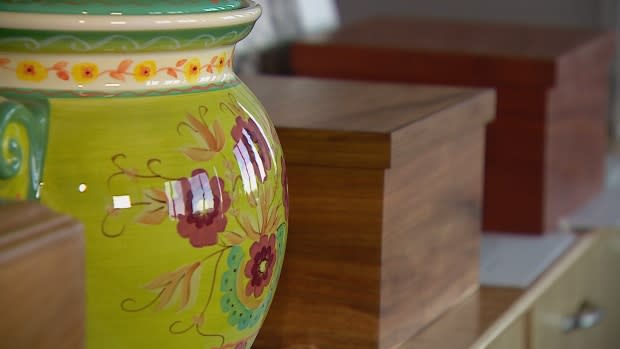Why unclaimed cremated remains sit on Nova Scotia funeral home shelves
Hundreds of deceased Nova Scotians aren't resting in peace.
In fact, for at least 727 of them, their cremated remains sit on a shelf in a funeral home. They are unclaimed by their families — one since the 1950s and another two from the 1960s.
In October, Service Nova Scotia sent a survey to funeral homes, crematoriums and cemetery licensees, saying it was considering regulations about unclaimed cremated remains after being contacted by funeral professionals asking what to do with them.
Sixty-three of 87 funeral homes responded. Thirty-one have no remains, while one has 124 and another has 111. On average, there are 11 per funeral home.
"We have gathered enough information to assist in our analysis of this situation and the findings will be included in our next review of funeral legislation in Nova Scotia," Service Nova Scotia spokesperson Gary Andrea said in an email.
No regulations in Atlantic Canada
Nova Scotia is not alone in its lack of legislation around unclaimed remains.
New Brunswick, P.E.I. and Newfoundland and Labrador have no regulations governing unclaimed remains, however, a government spokesperson says Newfoundland plans to consider the issue.
It's a different story in Saskatchewan, where legislation was introduced in 2001 allowing funeral homes to dispose of cremated remains after one year.
Funeral homes must make "reasonable" efforts to contact family members. After a year, remains can be placed in a common grave, a columbarium or be scattered.
"Quite often, what funeral homes will do is they will purchase a site in a graveyard and then bury a number of cremated remains in a fibreglass vault," said Sandy Mahon, the registrar for the Funeral and Cremation Services Council of Saskatchewan.
He said funeral homes notify families and provide the date of interment, explaining if they want the remains after they are buried they are responsible for the cost to have them exhumed.
"That does prompt a lot of families to come forward and claim the cremated remains," Mahon said.
There are no rules in Saskatchewan about where cremated remains can be scattered.
"They are completely sterile so there is no prohibition in [scattering them]," he said, noting some diehard Saskatchewan Roughriders fans had their remains surreptitiously scattered at Taylor Field, the team's former home that has since been demolished.
Ontario funeral homes require deposit
In Ontario, funeral homes are also required to keep cremated remains for one year before they are buried in a cemetery, in common ground or placed in a niche. The common ground requires the funeral home to place the remains in a crypt with records of the exact location.
Unlike Saskatchewan, Ontario funeral home owners are not permitted to scatter ashes.

Ontario funeral homes can also charge a deposit of up to $350, which is returned to families when they pick up the remains.
"That deposit is there to encourage people to come back and pick up their [family member's] remains," said Carey Smith, the CEO and registrar of the Bereavement Authority of Ontario.
If the remains are unclaimed, the deposit is used to pay for burial.
Smith said funeral homes are expected to contact families about picking up the cremated remains during the year that they are held.
Why don't families pick up remains?
Smith said he doesn't know why families don't pick up remains, although he suspects it's because sometimes they don't know what to do with them.
"They don't necessarily want to take them home and maybe they haven't made arrangements for interring them somewhere, so, pending that, they figure, "OK, I know they're safe with a funeral director so I will go get them when I'm ready,"' he said.
Mark Hooftman, general manager of Atlantic Funeral Homes, said grief is difficult for many people who delay making a decision about what to do with the remains.
He said often the family will ask a funeral home to hold the cremated remains for safekeeping, but then contact is lost despite phone calls and registered letters.
"That could be for a number of reasons, whether the original purchaser died, moved away or is just unable or unwilling to deal with the thought of permanent memorialization," he said.
What are your wishes?
He said families may also have a hard time deciding what to do with remains because they don't know what the deceased person wanted.
He's urging people to discuss their wishes with their family members. He suggests people put their wishes in writing.
Hooftman said 70 per cent of Nova Scotians are choosing cremation, so the issue of unclaimed remains is a growing concern in the province.
He said anything the government can do to give funeral homes guidance about the unclaimed remains will be welcomed.
A Service Nova Scotia spokesperson said no decision has been about possible legislation to deal with the issue of unclaimed cremated remains.
MORE TOP STORIES

